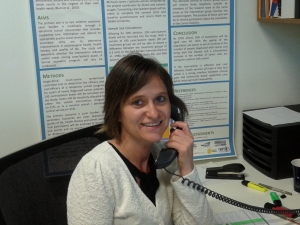Helping carers - an important calling
Research news
Having to care for a loved one with cancer is one of life’s most difficult challenges. Unglamorous, it is usually undertaken with tremendous self-sacrifice and, of course, much distress and heartache.
Deakin’s Research Fellow, Dr Leila Heckel, believes that just three phone calls could make a big difference to the lives of carers. She understands intimately the challenges of this type of care, having cared for her own mother, who, fortunately, recovered from her illness.
Working within the School of Nursing and Midwifery, Dr Heckel is currently working with Professor Trish Livingston, Associate Dean (Research), Faculty of Health, co-ordinating an NHMRC-funded multi-centre randomised controlled trial that aims to improve support for Australian carers of cancer patients.
The three-year study, now half-way through, is measuring the efficacy and cost effectiveness of a telephone outcall program involving 230 people with cancer and their carers from three Victorian and one South Australian hospital. The calls, provided through the Victorian and South Australian Cancer Council Helplines, offer supportive care, information and referrals to relevant psycho-social services.
“The value of informal carers to individuals, families and society is amazing, both economically and socially, and their support can last for years,” said Dr Heckel.
“Carers often assume this role in sudden and extreme circumstances, with minimal preparation and limited support from the healthcare system.”
“The provision of care is often physically, emotionally, socially and financially demanding, which can result in the neglect of carers’ own health needs. A recent study showed that almost half of carers provide from 21 to 40 hours, or more, of unpaid care each week.”
While they are providing practical, day-to-day physical care, carers are also having to deal with emotional reactions, such as worry, depression, anxiety, frustration and fatigue.
“While we are still looking at baseline data, we can already see how many carers have unmet needs, which can vary according to gender, age or socioeconomic status. It is important to address these needs to minimise burden and depression in this vulnerable group,” Dr Heckel said. “We also know that support is especially important at the very early stages of diagnosis and treatment.”
“When they first receive the diagnosis, both the patient and carer are in shock and they struggle to absorb and process the information provided by their health professionals. Cancer treatment may cause severe side effects which can also be very challenging for the carer to deal with .”
Dr Heckel explained that the goal of the project is to provide three telephone outcalls to carers – an initial call soon after a patient’s diagnosis, a second during treatment, four weeks later, and a third, three months after that, when many patients have completed treatment and start the survivorship phase of their condition.
While this seems like a drop in the ocean, Dr Heckel believes the calls could “make a big difference to carers’ lives.”
“Many carers have severe time constraints. They may be working full-time, providing care, or attending medical appointments, for instance,” she said. “Phone call support is one of the most efficient and manageable ways to help them.”
“The use of a telephone service also means that access to information and counselling is not restricted by geography."
If the intervention is found to be effective, it has the potential to be established in cancer helplines across all states, servicing public and private, as well as metropolitan, rural and regional health services throughout Australia.
The infrastructure and staff are already in place, through the Cancer Council helplines, with the Victorian Helpline providing information and support to 23,100 individuals each year.
"Despite the support the cancer helpline provides, the research tells us that many carers are not aware of this valuable service," said Dr Heckel. "One of the aims of the project is to increase awareness of the service and the information and support it can provide to both patients and carers."
“The difference with our program is that we make the calls - providing the support that we know is needed.”
Dr Heckel made the move to Australia from her native Germany around 10 years ago, when she arrived to complete her PhD at the University of Wollongong. She spotted the job at Deakin while back in Germany caring for her own mother, who was suffering from a debilitating illness.
“I thought this was just the perfect study for me,” she said. “From my own experience, I understood how overwhelming caring is. There is so much responsibility, trying to come to grips with the illness, doing research on the internet, monitoring medication, and advocating for the patient.
"I thought it would be wonderful if I could help to improve the lives of other carers.”
Share this story
 Helping the carers - Dr Leila Heckel.
Helping the carers - Dr Leila Heckel.
